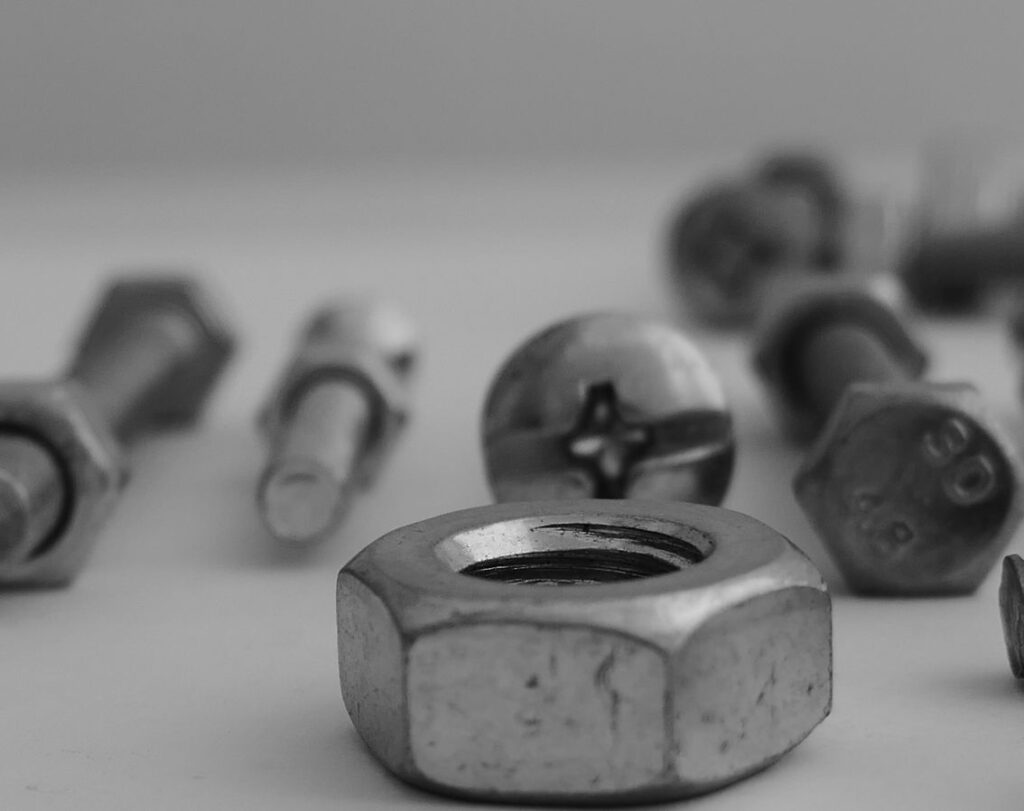ASTM Specifications
Threading is the process of creating a screw thread. There are various methods for generating screw threads. The method chosen for any one application is chosen based on constraints—time, money, degree of precision needed (or not needed), what equipment is already available, what equipment purchases could be justified based on the resulting unit price of the threaded part (which depends on how many parts are planned), etc. At Techni-cal Metal we provide the highest quality threaded product at the best value. Roll and cut the thread as per the required diameter.
A193 Grades
- B7 Alloy steel, AISI 4140/4142 quenched and tempered
- B8 Class 1 Stainless steel, AISI 304, carbide solution treated
- B8M Class 1 Stainless steel, AISI 316, carbide solution treated
- B8 Class 2 Stainless steel, AISI 304, carbide solution treated, strain hardened
- B8M Class 2 Stainless steel, AISI 316, carbide solution treated, strain hardened
The ASTM A307 specification covers carbon steel bolts and studs ranging from 1/4″ through 4″ diameter. This is your everyday, run of the mill bolt specification often manufactured using A36 round bar. There are three grades A, B, and C* which denote tensile strength, configuration, and application.
The ASTM F1554 specification was introduced in 1994 and covers anchor bolts designed to anchor structural supports to concrete foundations. F1554 anchor bolts can take the form of either headed bolts, straight rods, or bent anchor bolts. The three grades 36, 55, and 105 designate the minimum yield strength (ksi) of the anchor bolt. The bolts can be either cut or roll threaded and a weldable grade 55 can be substituted for grade 36 at the supplier’s option. Color coding on the end – 36 blue, 55 yellow, and 105 red – helps facilitate easy identification in the field. Permanent manufacturer and grade marking is allowed under the S2 supplementary requirements.
ASTM A325 specification covered high strength heavy hex structural bolts from 1/2″ diameter through 1-1/2″ diameter. These bolts are intended for use in structural connections and therefore have shorter thread lengths than standard hex bolts.
ASTM A490 specification covered quenched and tempered, alloy steel, heavy hex structural bolts from 1/2″ diameter through 1-1/2″ diameter with a minimum 150 ksi tensile strength. These bolts are intended for use in structural connections and therefore have shorter thread lengths than standard hex bolts. A490 bolts are similar in application and dimensions to A325 heavy hex struc-tural bolts but are made from an alloy steel rather than a medium carbon steel, resulting in a higher strength fastener.
Grade 8.8 Bolts are manufactured using medium carbon steel that has been quenched and tem-pered. Used in railroad equipment, motors, engines and processing equipment, grade 8.8 bolts exhibit good tensile strength and perform well in most environments.
Class 10.9 Precision Hex Bolts have 40% higher clamp load than Class 8.8. They are manufactured to AS1110.1. to ensure the highest quality product is supplied
EN14399-3 HR CI 8.8 High Strength Bolting Assemblies for Preloading are manufactured to the highest international standards.Among the many standards and quality certifications, the “Con-formite Europeene” CE Marking stands out. With this certification, products are assured to be manufactured to a high level of protection with regard to health, safety and environmental haz-ards.
Grade 4.6 Bolts/Screws/Studs manufactured from Low or medium carbon Alloy Steel in size range of M5 upto M100 with minimum Tensile Strength of 400Mpa. ASTM A 36 ASTM A36 is the most commonly used mild and hot-rolled steel. It has excellent welding prop-erties and is suitable for grinding, punching, tapping, drilling and machining processes.
S275 steel plate meets European structural steel standard EN 10025 : 2004. S275 structural steel plate is a common carbon structural steel with minimum yield strength of 36 ksi, it bears many similarities to ASTM A36 in both chemistry and physical properties. S275 can be known as an equivalent to ASTM A36. S275 structural steel plate can be bolted, riveted and welded in a full range of construction and fabrication including bridges and other general structural projects.
Stainless steel type 316 and type 304 are raw material grades for stainless steel. Stainless steel fasteners are sometimes referred to and ordered as their raw material grades (such as SS 316 and SS304).Type 316 stainless has a unique chemical composition which includes 16% chromi-um, 10% nickel and 2% molybdenum. Type 304 stainless has 18% chromium, 8% nickel and no molybdenum (this is where the “18-8” designation comes from). Stainless steel 316 is more resistant to chlorides than stainless steel 304, making it the preferred material for marine con-struction.
Sometimes, a type “SS316L” or type “SS304L” bolt will be specified in a particular application. The “L” at the end of these designations refers to the low carbon content of the steel. Stainless steel certified to 316L or 304L will have a maximum of 0.03% carbon, versus the 0.08% maximum that regular 316 and 304 can have.


